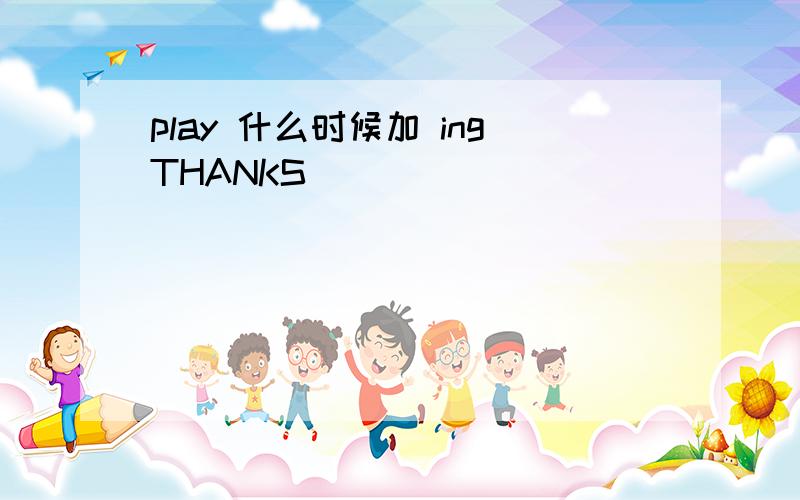play 什么时候加 ingTHANKS``
来源:学生作业帮助网 编辑:作业帮 时间:2024/10/04 05:08:25

play 什么时候加 ingTHANKS``
play 什么时候加 ing
THANKS``
play 什么时候加 ingTHANKS``
Sb is playing sth 现在进行时
1.表示“打”球,可作及物动词和不及物动词,后接表示球类的名词,不与冠词连用;表示“与(对手)比赛”,常与against连用,也可省略against.
They've been playing football a lot lately.最近他们一直踢足球.
Tom is playing (against) John in the tennis match.这场网球赛是汤姆对约翰.
2.表示“演奏”乐器,为及物动词,后接表示乐器的名词,与the连用;接表示音乐的名词,与a(n)或the连用;接以人代表作品的名词,则不与冠词连用.
The girl played the piano quite beautifully.这女孩钢琴弹得很漂亮.
The children are playing a march.孩子们正在演奏一首进行曲.
She plays Chopin very well.她演奏萧邦的作品很出色.
3.表示“打(牌);下(棋)”,为及物动词,不与冠词连用,但与game连用时,常与the连用.
Do you like playing bridge / cards / poker?你喜欢打桥牌/牌/扑克吗?
They often play chess.他们经常下棋.
He will show us how to play the game.他将给我们演示怎样玩这个游戏.
4.表示“演出;扮演;假扮”,可作及物动词和不及物动词,后接名词时用不用冠词要看情况来定.
The children played doctors and nurses.孩子们假扮医生和护士玩.
She played the part of the mother-in-law.她扮演婆婆.
5.常用短语有play with玩弄,比赛;play a part / role in起……作用;play a trick on捉弄;play a joke on开玩笑;play at 玩某种游戏;play back重放(录音、唱片等).
She was playing with the idea of studying abroad.她动起了出国留学的念头(但并非很认真).
She never plays (at) cards.她从来不玩牌.
当前面是介词或固定的词组上加`
1. 进行时
2. 动名词
1.进行时态
2.状语从句、其他需要动名词的固定结构(比如have difficulty in playing basketball)
enjoy do well in be good at coutinue finish mind practise
I just konw these ,sorry!
进行时